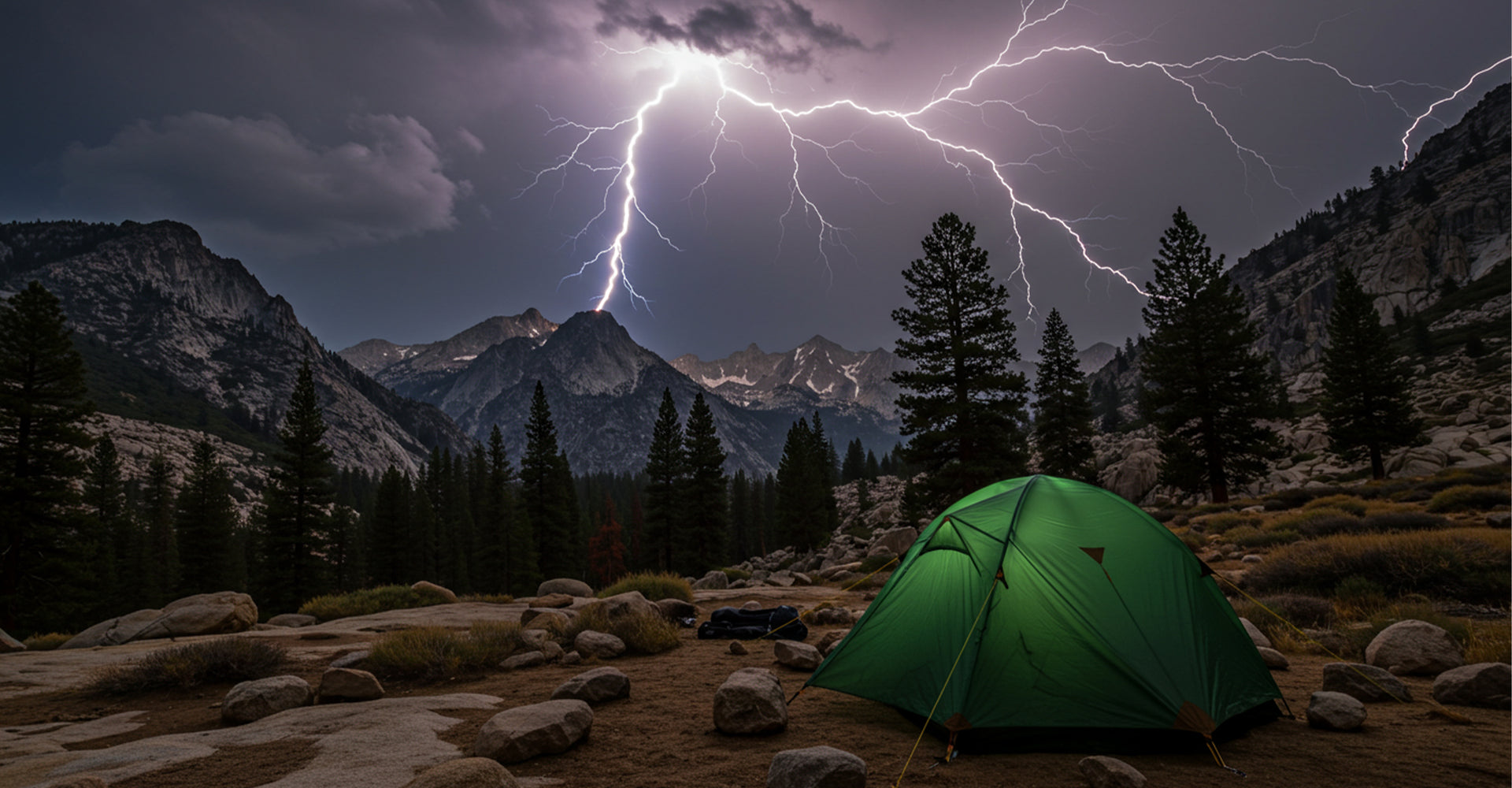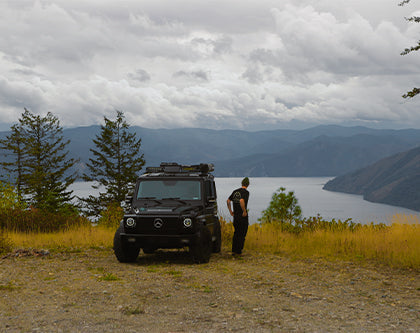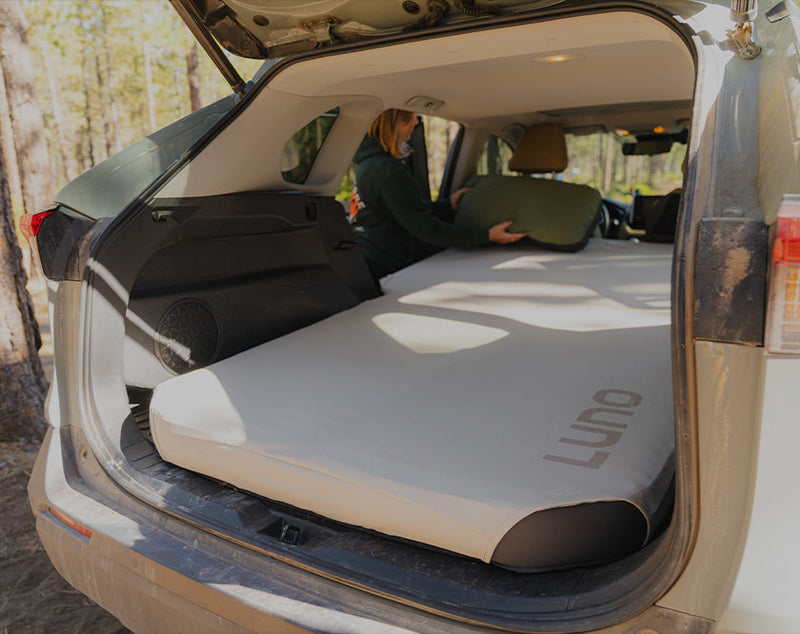
Why Camping in Your Vehicle is Safer Than a Tent
Considering sleeping in your car on your next camping trip? Good call. While we’ll always have a soft spot for traditional tents, we believe that camping in your car is often the safer option, especially when you factor in weather, wildlife, and campground security.
Don’t get us wrong, we love camping in tents—we just love camping in cars much, much more. Why do we prefer to bed down in vehicles? First and foremost, our award-winning air mattresses are much more comfortable than traditional camping pads on uneven ground, enabling road trippers to get a good night’s sleep anywhere. And then there’s convenience: you don’t need to pitch a tent upon arrival at your destination—just crawl into the back and crash. We harp on comfort and convenience all the time, but there’s another advantage to car camping that doesn’t get talked about nearly enough: safety.
Below, we’ll unpack the safety benefits of car camping and why more and more adventurers are making the switch from tent to trunk.
Is Camping in Your Car Safer Than a Tent?
The short answer: yes, sleeping in your car is safer than sleeping in a tent.
The long answer: A lockable metal shell is just harder to mess with than a thin layer of nylon and some zippers. Let’s break it down by the main hazards most campers face.

Stay Protected from Weather
Camping in the Rain and Wind:
Tents today are well-engineered, but even the best can flood or collapse in severe conditions. Heavy rain can seep through seams, and strong gusts can bend poles or send your tent tumbling.
A car, on the other hand, is watertight and wind-resistant by design. Sure, strong winds might rock your ride, but it won’t collapse on top of you in the middle of the night. Pro tip: park your car facing into the wind for better aerodynamics and less shaking.
Camping in the Snow and Cold:
Winter camping in a tent requires specialized gear (think: pricey four-season tents, snow stakes, and beefy sleeping pads). But a car already comes with insulation, a raised platform, and the ability to retain heat far better than fabric walls. Add some insulated window covers, a sleeping bag rated for cold temps, and you’ve got a winter-ready shelter.
Another bonus? You can always start the engine for a few minutes to run the heater if conditions become unbearable which is something no tent can offer.
To learn more about camping in the cold, check out our full guide on the topic and learn about tips and tricks for keeping warm while camping in the cold.

Lightning Protection
Tents are no match for lightning. According to the National Oceanic and Atmospheric Administration (NOAA), cars with a metal roof act as a Faraday cage, conducting electricity around you and into the ground. Just make sure your windows are rolled up and avoid touching metal surfaces inside the car.

Wildlife
Q: What do bears, moose, wolves, snakes, spiders, and cougars have in common?
A: We have no interest in cuddling with them while camping.*
*Although I suppose this depends on your definition of “cougar” and your relationship status/dating preferences.
We’re no strangers to wildlife. We’ve tent camped extensively in grizzly country, woken up to a snorting, peeved 1,200-pound moose stomping circles around our tent, and even brushed scorpions off our bedding. And while we’re game for wildlife sightings, we aren’t inviting apex predators and poisonous creepy crawlers into our living spaces. Hell to the no.
Camping in a locked car makes encounters with full-grown grizzlies and moody moose much less puckering—worst case scenario, you can always jump into the driver’s seat, start the car, and scram. The raised platform reduces the chances of a snake in your sleeping bag, too.
In all likelihood, you can probably tent camp for decades without a life-threatening interaction with wildlife, but camping in a vehicle undeniably lowers your risk. If you have a low risk tolerance—or you simply get spooked easily—then camping in a car is the way to go.

Campground Crime
We don’t like to think about it, but human threats can be more concerning than wildlife. Remote campgrounds aren’t immune to theft other crimes. The last thing we want to do is scare you into not camping at all but we always believe its better to be informed and prepared than not going at all. If you're looking to add another level of privacy to your vehicle the Luno Window Screens and Privacy Curtain are a few pieces of gear to help protect against prying eyes.
Protecting Your Belongings
Getting your gear stolen is a quick way to ruin an otherwise epic camping trip. While it’s possible to lock tent zippers with a TSA travel lock, it’s not a very common practice. Why? Well, because anyone can easily cut through nylon tent walls. We’ve put enough accidental holes in tent walls over the years to know that you don’t even need a knife to cut through the fabric–a nail clipper, toothpick, or jagged rock would do the trick just fine. You can, however, lock a car. Yes, people break into locked cars, too, but it requires more effort and minimizes the chances of opportunistic theft. Locking your gear in your vehicle isn’t a surefire bet, but, in our opinion, it’s a better way to secure your belongings then leaving them unattended in a flimsy tent.
Protecting Yourself
For solo campers or anyone concerned about security, the ability to lock yourself inside can provide peace of mind. While no place is 100% safe, most people feel more comfortable sleeping in a vehicle than inside a nylon shell that someone could unzip in seconds.
- For added safety, consider:
- Parking in well-lit, designated campsites
- Carrying personal protection (like pepper spray)
- Using an emergency communication device (Garmin inReach, satellite messenger)
- Trusting your instincts, if something feels off, move your car to a different spot. The best thing about your bed being on wheels is that you can make for a quick getaway.
Convenience and Comfort (Bonus!)
Safety aside, there are extra perks to car camping:
- Faster setup: No tent poles, stakes, or rainflies to fuss with. Just park and sleep.
- Comfort: Pair your vehicle with a purpose-built air mattress (like the Luno Air Mattress) and you’ll sleep on a flat, supportive surface instead of uneven ground.
- Stealth options: Need a quick roadside nap or a low-key overnight stop? Cars offer flexibility that tents can’t.
So Is Vehicle Camping Safer Than Tent Camping?
So, is car camping safer than tent camping? Absolutely.
- Cars handle extreme weather far better than tents.
- They reduce the risk of unwanted wildlife encounters.
- Locks add a layer of security against crime that tents simply can’t match.
That doesn’t mean you should ditch tent camping altogether—there’s still something magical about falling asleep under a nylon roof with the stars overhead. But if safety, comfort, and peace of mind are top priorities, vehicle camping is tough to beat.
Whichever option you choose, stay smart, stay safe, and most importantly—enjoy the adventure. We’ll see you out there, snoozing soundly in the back of the vehicle.










